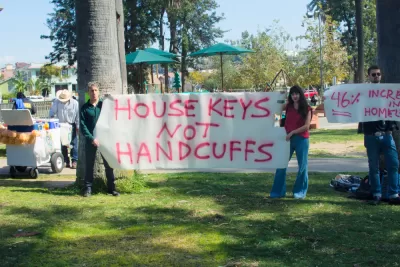‘Housing First’ and other evidence-driven homelessness response programs are showing success in some cities and regions while the number of unhoused people rises across the nation.

A Brookings report by Hanna Love and Tracy Hadden Loh assesses the state of homelessness in the United States and how some cities and regions are making progress on housing their residents even as housing costs grow and the supply of affordable housing remains insufficient to meet demand.
“In nine out of the 44 major cities that completed full PIT counts in 2023, homelessness rates either remained stable or declined between 2022 and 2023, with rates in Austin, Texas, Raleigh, N.C., Indianapolis, and Colorado Springs, Colo. declining over 10 percentage points.” Major cities like New York, Boston, and Chicago saw sharp increases in homelessness rates between 2022 and 2023, but those cities saw an overall reduction in homelessness over the last decade.
Looking at the larger picture of short- and long-term total and unsheltered homelessness trends, it’s clear that there are pockets of both progress and setbacks in U.S. cities—reinforcing the need for upstream solutions that can meet cities and regions where they are.
The report recommends five evidence-based strategies that can help ease the crisis. These include ensuring that housing policy tracks with homelessness policy, using both short- and long-term tools like emergency rental assistance, ‘housing first’ models, and zoning reform that spurs more housing production. Other suggestions include strengthening housing and employment supports for vulnerable populations, using alternative crisis response models to reduce the risk of negative interactions with law enforcement, and taking a “regional, data-driven approach” to homelessness to respond to broader structural challenges.
FULL STORY: Despite a national spike in homelessness, some US regions are finding solutions

Alabama: Trump Terminates Settlements for Black Communities Harmed By Raw Sewage
Trump deemed the landmark civil rights agreement “illegal DEI and environmental justice policy.”

Planetizen Federal Action Tracker
A weekly monitor of how Trump’s orders and actions are impacting planners and planning in America.

The 120 Year Old Tiny Home Villages That Sheltered San Francisco’s Earthquake Refugees
More than a century ago, San Francisco mobilized to house thousands of residents displaced by the 1906 earthquake. Could their strategy offer a model for the present?

In Both Crashes and Crime, Public Transportation is Far Safer than Driving
Contrary to popular assumptions, public transportation has far lower crash and crime rates than automobile travel. For safer communities, improve and encourage transit travel.

Report: Zoning Reforms Should Complement Nashville’s Ambitious Transit Plan
Without reform, restrictive zoning codes will limit the impact of the city’s planned transit expansion and could exclude some of the residents who depend on transit the most.

Judge Orders Release of Frozen IRA, IIJA Funding
The decision is a victory for environmental groups who charged that freezing funds for critical infrastructure and disaster response programs caused “real and irreparable harm” to communities.
Urban Design for Planners 1: Software Tools
This six-course series explores essential urban design concepts using open source software and equips planners with the tools they need to participate fully in the urban design process.
Planning for Universal Design
Learn the tools for implementing Universal Design in planning regulations.
Clanton & Associates, Inc.
Jessamine County Fiscal Court
Institute for Housing and Urban Development Studies (IHS)
City of Grandview
Harvard GSD Executive Education
Toledo-Lucas County Plan Commissions
Salt Lake City
NYU Wagner Graduate School of Public Service





























